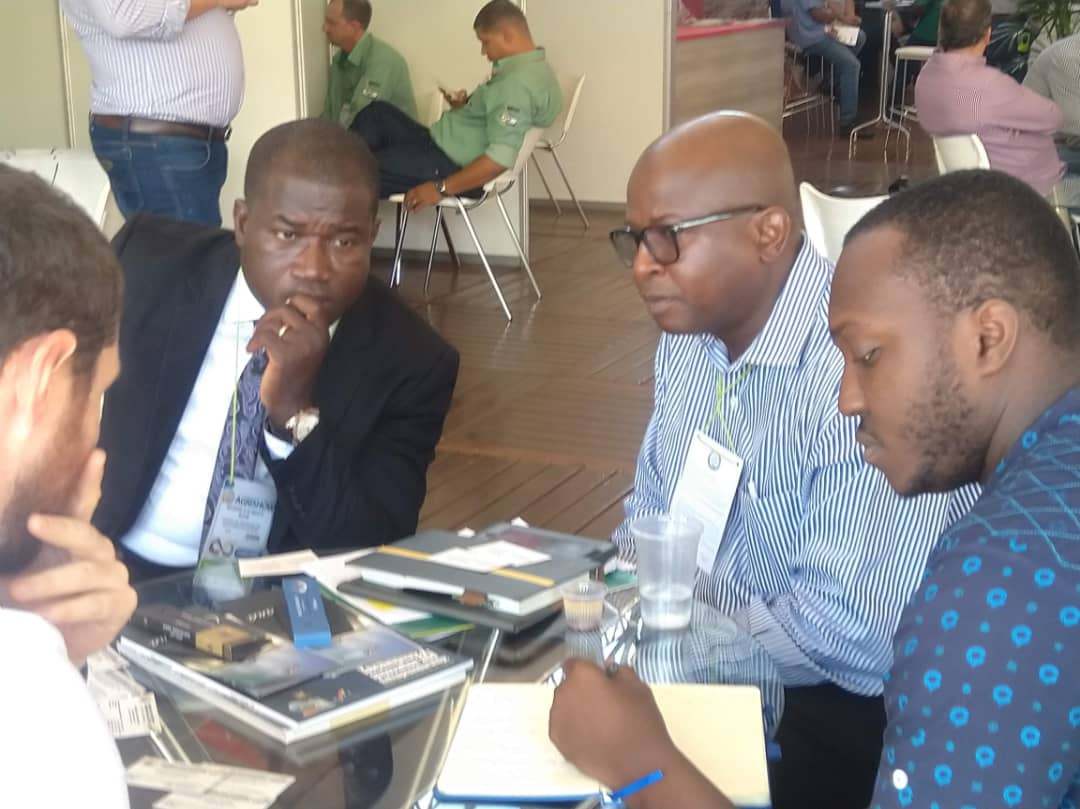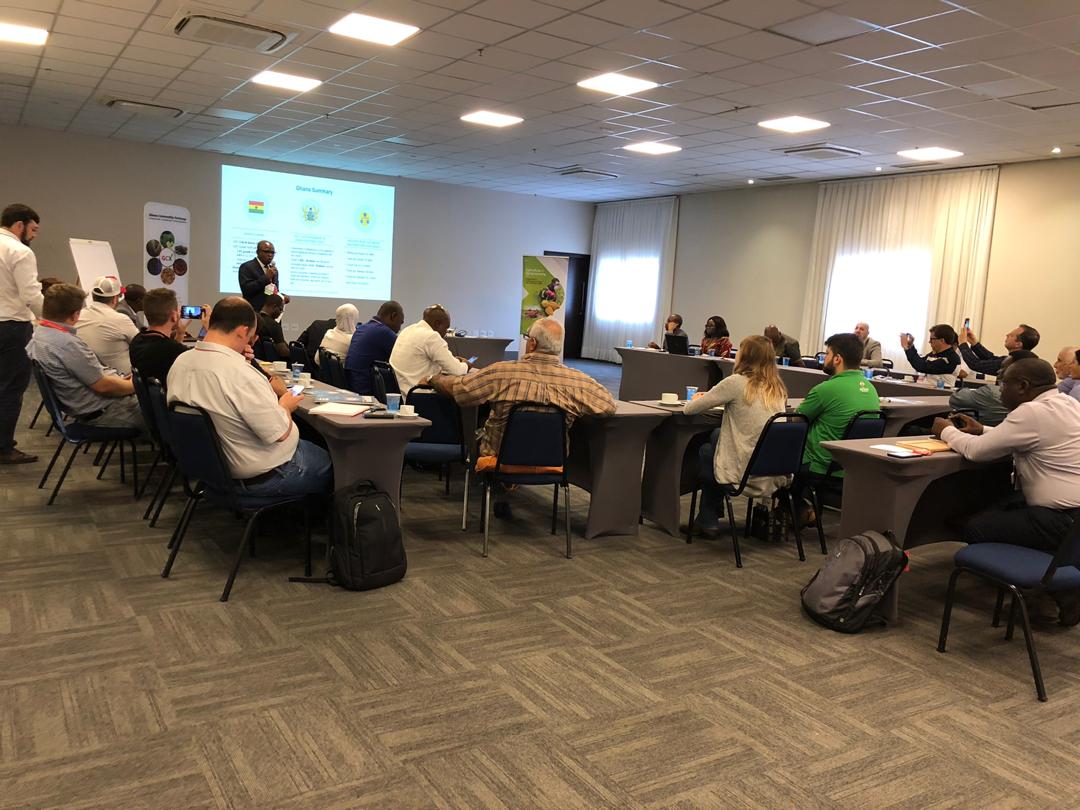
by Bismark | May 10, 2019 | Press Release
Agrihouse
Foundation and the Ministry of Food and Agriculture are currently in Ribeirao,
Brazil with a strong Ghanaian contingent to participate in the 26th edition
of Agrishow.
A
17-Memner Delegation, led by the Deputy Minister for Food and Agriculture, Hon.
Sagre Bambangi and Alberta Akyaa Akosa, the Executive Director of Agrihouse
Foundation are in the South American country to represent Ghana at the event.
Representatives from, Ghana Investment
Promotion Council, Ghana Commodity Exchange, Jospong Group, Accra Company and
Recycling and Ghana Commercial Agric Project left the country over the weekend
to be part of the annual agric showpiece.
Agrishow
is the World’s third largest Agric trade event and arguably the most important
agricultural technology trade show in the world. It brings together
agricultural solutions for all types of agribusiness and related sector needs.
With
over 800 national and international brands from different investment segments
across the globe participating, the Ghanaian contingent has a unique
opportunity to meet and create mutually beneficial partnership with peers along
the agribusiness value chain.
This year’s
event will highlight all the latest products, services and technology that is
available to stakeholders in the world of agriculture.
Participants
from Ghana are drawn from, Government Agencies, Organisations, Investors,
Poultry and Livestock, Fisheries and Aquaculture, Producers, Packaging and
Processing, Producers, Inputs Dealers, ICT, Finance and individuals with
interest in the agric industry .
The
conceptual undertone for the event this year will position the Ghanaian
delegation for greater impact. Particularly for those looking to enhance their
businesses through strategic partnerships, networking and exchange of ideas,
Ghana has the platform to draw the rest of the world’s attention to the
investment opportunities in the country’s agribusiness industry
The
team will during the course of the four day event participate in:
- Exhibitions
- Field Trips and Demonstrations
- Business Presentations and Investments
- Business – to – Business Meetings
- Formal Technical and Practical Training workshops and
conferences
The 4-day event is expected to host over one hundred
and sixty thousand visitors-an improvement on the $808 million businesses
initiated last year at the fair- to create opportunities for participants to
make new contacts and promote their brands.
What this means is that Agrishow is going to be a
gathering of all who matter in agribusiness around globe with a solitary goal
of identifying new investment opportunities, groundbreaking technologies,
partnerships and acquiring requisite knowledge to succeed.
Ghana will have
the opportunity to make an investment presentation to the world’s topmost
investors in agribusiness on Thursday May 2nd 2019.
The private companies participating will also get to
meet peers from other parts of the world looking for collaborations and
partnerships around the world.
On route to Brazil, Hon. Sagre had this to say “We are
going to Brazil to sell to the rest of the world the good news about investing
in Agribusiness in Ghana and we believe the world will have no choice than to
look at Ghana.”
He indicated that with government’s commitment towards
changing agriculture in the country and using it as a tool for improving the
livelihood of the people, there so much to share to the world and so the event
could not have done at a better tone.
Mrs Akosa assured delegates of her organization’s commitment
towards ensuring their comfort and access to all the information and contacts
needed to make the trip successful.
Agrihouse Foundation, Ghana’s leading pro-agric event
firm is the liaison organization between Ghana and the organizers for the 2019
edition of Agrishow.
The delegation is expected to return on the 4th
of May 2019.

by Bismark | May 3, 2019 | Article
Annually
the value of imported food into the country stands at a whopping US $2.4
billion. Key products that are imported are frozen chicken, meat, and rice,
tomato paste, cooking oil, sugar and sorghum.
“At US$2.4 billion, the cost of food imports is about a quarter of the
value of non-oil imports, which closed 2017 at US$10.66 billion,” the Daily Graphic newspaper recently
reported.
This
huge amount of imports is a major concern and it has many unpremeditated
effects. Business people who import the food need foreign currency (usually US
dollars) to pay their suppliers abroad and this puts pressure on the local cedi
leading to volatilities. Paying for these suppliers abroad means farmers and
agro-business people in those foreign supplier countries stay in business and
create more jobs. But locally, our farmers cannot compete and are thrown out of
business. The recent dip in the value of the cedi is perfect example of the
negative implications of unbridled import.
In
the words of Henry Kerali, World Bank country director for Ghana, “Agriculture is an
important contributor to Ghana’s export earnings, and a major source of inputs
for the manufacturing sector. It is also a major source of income for a
majority of the population, but we have seen a recent reduction in growth in
agriculture, which needs to be reversed through appropriate policies and
increased investments.”
This
call by the Mr. Kerali seems to have found the listening ears of no less an
entity than the central government.
This is
demonstrated in the newly inaugurated Planting for Export and Rural Development
(PERD) programme which is expected enhance the country’s foreign exchange-earning
capacity and generate jobs.
According to President
Nana Addo Dankwa Akufo-Addo the new programme will ensure that Ghana’s economic
fundamentals are restructured in the right shape.
Speaking at the launch of PERD, a module under the government’s Planting for
Food and Jobs programme, the President said his government will be committed to
developing a designated list of tree crops, all of which are grown in Ghana but
are currently non-traditional exports.
He further noted
that PERD, which is tailored towards increasing cultivation of foods such as
cashew nuts and mangoes, presents Ghana with opportunities for diversifying her
economy and will open up new revenue streams even as
the government the makes effort to
establish an institution to regulate tree crop development in the country.
“A draft bill for
the development of the tree crop sector will shortly be approved by cabinet,
prior to its submission to Parliament.
“The bill, when passed by Parliament, will establish the Tree Crop Development
Authority (TCDA). The proposed Authority will provide policy direction and
regulation for the development of the sector,” he assured.
Four crops are
covered in the draft law: cashew nuts, oil palm, rubber and shea. It is hoped
that two more will boost the final legislation and bring the total to six –
coconuts and coffee.
Programme Overview
The Planting for
Export and Rural Development (PERD) Programme is a decentralized National Tree
Crop Programme to promote rural economic growth and improve household incomes
of rural farmers through the provision of certified improved seedlings,
extension services, business support and regulatory mechanisms.
To create a
legacy towards the realization of the Ghana Beyond Aid Agenda, the Government
of Ghana through the joint effort by the Ministry of Local Government and Rural
Development and Ministry of Food and Agriculture rolled out the PERD programme
to develop nine (9) commodity value chains namely Cashew, Coffee, Cotton
Coconut, Citrus, Oil Palm, Mango, Rubber and Shea through a decentralized system.
The programme
seeks to create sustainable raw material base to spur up the decentralized industrialization
drive through One District Factory initiative. The 5-year PERD programme will
support 1million farmers in 170 districts with certified free planting
materials to cover over one (1) million hectares of farmlands and engage 10,000
young graduates as crop specialized extension officers.
The President noted that aside from the benefit of a diversified revenue base
for Ghana, PERD will link agriculture to industry by providing a solid raw
material base for industrialization will also help develop rural economies and
support the structural transformation of the economy.
“The selection of
crops in each district depends upon the ecological zone,” he announced. “The
initial effort in preparation of the PERD has met with resounding success, with
the establishment of nurseries all over the country.
“In the initial years of the programme, a total of 32,591 hectares will be
planted with the tree crops in 191 districts.
“Some seedlings
have been displayed at this event today. The enthusiasm with which the district
chief executives have embraced the PERD is very commendable, and the intense
interest clearly indicates that leadership of the programme at the local level
is assured.”
He said with the
government having revamped agriculture, PERD will complement other flagship
policies and programmes such as One Village, One Dam, One District, One Factory
and One District, One Warehouse to provide a historical opportunity to change
the direction of agriculture in Ghana.
Other institutional measures such as the Ghana Commodity Exchange, the Ghana
Incentive-based Risk-Sharing System for Agricultural Lending (GIRSAL) and a
refocusing of the mandate of the Agricultural Development Bank are being rolled
out to support the government’s transformation agenda, President Akufo-Addo
said.
He expressed
confidence that once all these initiatives are serving their purpose, his
government’s bold approach will be vindicated.
“The overarching vision of a Ghana Beyond Aid is not mere rhetoric, nor
political gimmickry. As a government, we are determined through action to
achieve this vision, and today’s programme is a clear indication of our genuine
commitment.
According to a
2018 World Bank report dubbed “The Third Economic Update, Agriculture as an
Engine of Growth and Jobs Creation”, the agriculture sector’s potential to be
one of the leading sectors for a more diversified is clear as the light of day.
“The economy is
again rapidly expanding,” said Michael Geiger, World Bank senior economist and
co-author of the report. “There is need to channel public resources into
research to increase the use of technology, invest in irrigation infrastructure
to increase productivity and mitigate the potential adverse effects of climate
change, and leverage increased private sector investment in agriculture,”
One challenge,
the report notes, is the weak legal and regulatory framework for attracting
private sector investment into agriculture. According to the 2017 World Bank’s
Enabling the Business of Agriculture (EBA) report , reforms are needed to improve
the quality and efficiency of regulatory systems that govern access to key
agricultural factors such as seed, fertilizer, machinery, finance, markets,
transport and information and communication technologies.
While the Planting
for Export and Rural Development (PERD) program is a step in the right direction,
the enthusiasm that was noticeable among key stakeholders during the launch
must not fizzle out any time soon. Indeed we expect government and other
relevant stakeholders to sustain the policy through practical input that are
relevant and responsive to 21st century dynamics. This way, we can
genuinely expect to reap the optimum dividends of what is clearly an ingenious
policy direction for Ghanaian agriculture.






